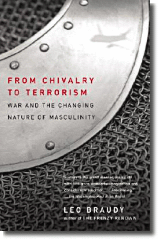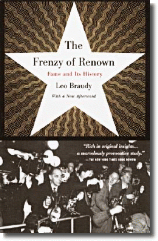
His book From Chivalry to Terrorism: War and the Changing Nature of Masculinity (2003) "tracks the complex relationship between the changing methods and goals of warfare and shifting models of manhood. This journey takes us from the citizen soldiers of ancient Greece to the medieval knights to the misogynistic terrorists of Al Qaeda."
I asked the author to apply the "page 69 test" to his book. Here is what he reported:
I think such a cross-section or salami slice works better for nonfiction than for fiction. The agenda of nonfiction is more similar page by page than is fiction's. Of course in nonfiction there are arguments to be built up, anecdotes to be told, facts to be asserted or disputed, characters to be sketched and theories to be invoked or contradicted. Any one page can have some or a few or even all of these going on at once. But nonfiction has to lay its cards on the table a lot earlier and keep referring to them with a lot more frequency than does fiction, which can wander on and on for a hundred or more pages before hitting you with those zingers that makes you want to keep on reading. Page 69 in From Chivalry to Terrorism follows through on this distinction. I can’t say it stands alone, but it does give a brisk idea of how the rest of the book goes about the business of trying to sketch the history of the interplay between changes in warfare and changes in ideas about masculinity. Page 69 in particular looks at the way medieval warriors and medieval peoples asserted status by connecting themselves to the heroes of the past: “Thus the French descended from the Franks and the greatness of Charlemagne, the English from Brutus (the great-grandson of Aeneas), the Norman and Scandinavians from the Vikings, while Thor himself, according to the thirteenth-century Prose Edda, was a descendant of Priam, the king of Troy and the father of Hector.” The genealogy of past heroes was invoked to guarantee heroism in the present, even when that present hero’s connection to the mythical or historical past was made up by some paid historian or poet. It’s an early moment in the story of how masculinity asserts its connection to history, before gunpowder, cannons, airplanes, and nuclear bombs complicate the easy equation of masculine honor and masculine prowess in war.Many thanks to Leo Braudy for the input.
Click here to read an excerpt from From Chivalry to Terrorism.
Among the praise for the book:
“History in the grand manner, pulled off with brilliance, wonderful imagination and considerable erudition.... Fascinating.” —Washington Post Book WorldClick here to watch Braudy deliver a talk on "Cultural Shaping and Historical Change" at Harvard. The lecture addresses some of the themes covered in From Chivalry to Terrorism.
“A terrific topic.... The book displays Braudy’s loving immersion in his subject, fine grasp of historical complexity, and aversion for glib or dogmatic judgments.” –New York Times Book Review
Braudy's book Jean Renoir: The World of His Films was a finalist for the National Book Award. The Frenzy of Renown: Fame and Its History was a finalist for the National Book Critics Circle Award. He has written for the New York Times, the Washington Post, and Harper's. From Chivalry to Terrorism was named Best of the Best by the Los Angeles Times and a Notable Book of the Year by the New York Times.
Previous "page 69 tests":
David Nasaw, Andrew Carnegie
Leah Hager Cohen, Train Go Sorry
Chris Grabenstein, Slay Ride
David Helvarg, Blue Frontier
Marina Warner, Phantasmagoria
Bill Crider, A Mammoth Murder
Robert W. Bennett, Taming the Electoral College
Nicholas Stern et al, Stern Review Report
Kerry Emanuel, Divine Wind
Adam Langer, The Washington Story
Michael Scott Moore, Too Much of Nothing
Frank Schaeffer, Baby Jack
Wyn Cooper, Postcards from the Interior
Ivan Goncharov, Oblomov
Maureen Ogle, Ambitious Brew
Cass Sunstein, Infotopia
Paul W. Kahn, Out of Eden
Paul Lewis, Cracking Up
Pagan Kennedy, Confessions of a Memory Eater
David Greenberg, Nixon's Shadow
Duane Swierczynski, The Wheelman
George Levine, Darwin Loves You
John Barlow, Intoxicated
Alicia Steimberg, The Rainforest
Alan Wolfe, Does American Democracy Still Work?
John Dickerson, On Her Trail
Marcus Sakey, The Blade Itself
Randy Boyagoda, Governor of the Northern Province
John Gittings, The Changing Face of China
Rachel Kadish, Tolstoy Lied
Eric Rauchway, Blessed Among Nations
Tim Brookes, Guitar and other books
Ruth Padel, Tigers in Red Weather
William Haywood Henderson, Augusta Locke
Jed Horne, Breach of Faith
Robert Greer, The Fourth Perspective
David Plotz, The Genius Factory
Michael Allen Dymmoch, White Tiger
Patrick Thaddeus Jackson, Civilizing the Enemy
Tom Lutz, Doing Nothing
Libby Fischer Hellmann, A Shot To Die For
Nelson Algren, The Man With the Golden Arm
Bob Harris, Prisoner of Trebekistan
Elaine Flinn, Deadly Collection
Louise Welsh, The Bullet Trick
Gregg Hurwitz, Last Shot
Martha Powers, Death Angel
N.M. Kelby, Whale Season
Mario Acevedo, The Nymphos of Rocky Flats
Dominic Smith, The Mercury Visions of Louis Daguerre
Simon Blackburn, Lust
Linda L. Richards, Calculated Loss
Kevin Guilfoile, Cast of Shadows
Ronlyn Domingue, The Mercy of Thin Air
Shari Caudron, Who Are You People?
Marisha Pessl, Special Topics in Calamity Physics
John Sutherland, How to Read a Novel
Steven Miles, Oath Betrayed
Alan Brown, Audrey Hepburn's Neck
Richard Dawkins, The Ancestor's Tale
--Marshal Zeringue






